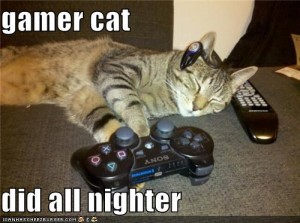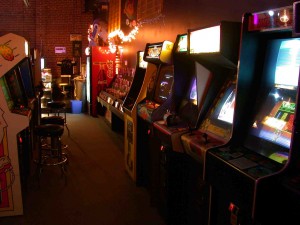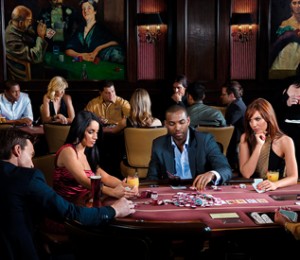An Unsocial Network For Gamers
by NorseGamer, HSM Editor-in-Chief
Is it possible to enjoy PlayStation Home without being social?
We hear it time and again from many of Home’s community leaders, myself included: “I’m here for Home’s social scene.”
There’s a bit of an inherent snobbery in this line. Humans, as a species, will always socially stratify themselves — and the implication is that if you’re really a person of note in Home, you have the social skills and inclination to hang out with your fellow man. And, to be fair, it’s easy to feel like you’re one of the Eloi, looking down at the Morlocks, when you’ve got a keyboard and a wallet and you’re watching a sea of badly-punctuated text bubbles in default clothing swarming around.
To be fair, though, in the early days of Home, it’s not like there was much else to do. So when you have a social network for gamers with very little in the way of games to play, the community turns inward upon itself for entertainment and creative impetus.
Here’s the thing, though: these aren’t the early days of Home any more.
Look around. Home has an astonishing number of games to play now, compared to four or five years ago. Home 2012 really is the Year of the Game, and it has reshaped Home in line with its new vision as a game platform. While some of the old stalwarts disapproved of this on their way out the door — likely because it made them feel less relevant than they wished — the reality is that Home is only now starting to live up to even part of the hype it had upon its initial launch.
More importantly, though: Home now has fairly immersive attractions which do not rely on the user’s level of social interactivity, or peripheral equipment such as a keyboard.
Remember, Home is a console-based virtual reality. Unlike its PC brethren, who already come equipped with keyboards and are populated by users who specifically sought a social experience, the PS3 is a game console owned and utilized by gamers. Games, therefore, should be the primary attraction to Home. The more games there are on tap — and particularly if they’re deep and immersive games — the less the objection of, “There’s nothing to do in Home” rears its head.
Here’s the fallacy in assuming that games will destroy the “soul” of Home: socialization still takes place. All you have to do is go to the poker tables at the Casino, Novus Prime, No Man’s Land, Sodium2, Cutthroats or any of the other major public game spots in Home and see that micro-communities of Home users have formed. Certainly, Home Tycoon, Mercia and some other major releases (presently unannounced) will have the same effect. My recent game of choice is No Man’s Land, which I’ve been rather addicted to, and I’ve gotten to know some really cool people there whom I wouldn’t have met otherwise, because the game provided a shared experience for us to discuss.
Games facilitate socialization in PlayStation Home.
This doesn’t mean that Home is completely on the right track. It’s still a metaverse with no purpose unto itself, as opposed to a living, breathing social MMO game, and there is a surprising absence of any major, formal community-building events in Home, as well as a shortage of means to create user-generated content in Home (although this is slowly changing). But it would take one hell of a curmudgeon to argue that the Home of yesteryear is anywhere near as varied and interesting as Home 2012.
You know what aspect of gaming I miss from my youth? The excitement of public gaming in a social environment. The thrill of the arcade. And perhaps this is what Home delivers so well: an excellent blend of gaming with an environment which promotes socializing for those who want to do so.
Moving forward, the lesson is simple: although Home now has sufficient games to reward the casual user who has no interest in socializing, the winning formula lies with gaming experiences which are conducive to in-world socialization. Home can never deliver the same firepower as a AAA game, but then those games can’t provide the same platform for socialization. Where a Home game becomes truly addictive, long term, is when it can allow the user to converse with friends while playing the game. Gaming and socialization should not be treated as separate activities; although certain games do not inherently lend themselves to socialization whilst in the game itself, the ability to chat with friends whilst immersed in the game world is the goal to strive for — particularly since such games can go longer without major content updates, since the community can entertain itself.
A good example of this is Hudson’s dolphy races. Although the game eventually died due to a lack of any supplemental content releases or support from Hudson, it managed to thrive for a long time because people filled up the waiting periods between races with conversation. Hence why, even though I’m not a Final Fantasy VII fan, if Square Enix ever jumped into Home, I’d want to see Chocobo breeding and racing introduced to Home. The formula’s already proven to work.
Another good example of this are the Casino poker rooms from Digital Leisure. The Home community screamed when the original EA Poker rooms were removed, simply because there was no other Home gaming experience which so perfectly blended socialization with gaming. We are quite fortunate that Digital Leisure not only reintroduced this experience to Home but in fact dramatically improved upon it, and it still irks me to this day that the people who howled the loudest never bothered to utter one word of public thanks when this came out.
The Home experience is no longer one homogenized environment in which the social strata are clearly delineated by bench glitchers and people with punctuation. Those days are gone. Home today is a decentralized gaming platform in which a multitude of disparate micro-communities have arisen. While it awaits formal community-building in-world events from SCEA to make it feel like a cohesive whole that’s connected to the rest of the PlayStation pantheon, it has finally managed to solve a key piece of the business equation: how to make a social network for gamers work when it’s populated by a lot of unsocial people.
Games were the solution. Games are the solution. Here’s hoping Home itself turns into a game, and gives users tools to create their own mini-games. Deepening the social interface of Home seems to be the next logical step in the platform’s evolution, to go hand-in-hand with the more robust and immersive games being introduced by Home’s third-party developers. We can but hope.






 LinkedIn
LinkedIn Twitter
Twitter
I agree Norse, what makes Home games fun is when you can play together and talk while doing it. It is much like clubs and personal spaces where you can converse with friends and the club/group chat function is wonderful in public areas when throwing an event as well. Games are and should be a big part of Home, and it is good to see the new ones are building on that need for socialization we all have.
I have seen Home evolve so much in the almost three years I have been here, I hope they keep heading this way and keep in mind that we like to communicate with each other as well as play.
The maze runs we did last night were a perfect example of a community building, user created event. If they give us the tools we will use them, so I hope they continue to do this.
Nice read.
I think we’re moving past the point where we can think of a unified, overall Home community, although the depth of the games that get released will certainly play a role in how things play out.
The main change is that the new wave of Home games builds from the Novus Prime formula; they are experiences unto themselves, with a bit of strategy and detail to master.
Already we’re seeing a shift in Home where users can pick and choose the kind of experience they want to have. Like shooters? Here’s Minibots and No Man’s Land. Like space combat? Enjoy Novus Prime. Like creating things? Blueprint and Home Tycoon. Like RPGs? Avalon Keep and Mercia.
It’s now possible to spend hours immersed in these particular styles of games, which is a huge departure from the beat-it-and-forget-it minigames that ruled Home’s first few years of development.
Granzella still excels at creating socially oriented spaces, and there are a couple in Japan that will strengthen that reputation when they arrive here, but these are geared more toward people who want to socialize than those who want to play a game.
So Home will split along the lines of those who come to socialize and those who want gaming experiences, and the gaming experiences group will further split according to the type of game they want to play. Ultimately, this is a great thing, because Home soon will offer a wide range of quality gaming experiences, many with deep social elements, but it will come at the cost of the general socializing that once happened at Central Plaza.
Unless you’re all Home all the time, there’s just no way to keep on top of the deeper gaming options and keep a regular social schedule. On the plus side, it may be easier to make friends if you have a Home game in common. On the minus side, it’s likely to incentivize management further away from overall community events in favor of more genre games and experiences.
I Hear (that) Wow, but I think one of the reasons Home has gone through such a massive ‘bikinis and trinkets’ phase is because of the largely unexpected, and purely social group that decended upon Home before it found its gamer-legs. If Home had launched with perpetual MMO inspired games like Mercia and Tycoon then the majority of users today would most likely be actual gamers. Instead Phil Harrison did a runner, leaving people back at Sony HQ scratching their heads and wondering what the hell to do with it. Micro transactions may have sullied the water of Homes purity and cause for most gamers that had hope in the idea, but I’m hoping that Mercia etc will bring some of them back.
Right now Home (to my mind) is still a glorified chatroom, which is fine, but also means as long as that’s what it looks like, that’ll be the demographic it draws in. Home is still an odd, mish-mashed mutant of everyone and no one’s DNA right now, but a good splice of gaming and maybe even a little gaming blog surgery would help turn it into something the more “hardcore” gamer (ugh) might condensed to use more frequently.
Condensed!? *ahem*
*Condesend
I do agree that Home has seen many landmark changes in the direction that it has gone. And I do respect developers in finally making up their minds as to which direction home will lean more toward. It IS a gaming platform, for a console.
I am of the old guard, the early adopters that came to Home for the social aspects, the ‘break’ from gaming to chat to people in some fantastic settings, i hope Home doesn’t lose sight of this any time soon.
I now can never really describe Home as a ‘Virtual World’, as it has a completely different structure when compared to it’s PC brethren. That doesn’t make this a bad thing. A ‘Gaming World’ is now far more apt. But it delivers on it’s promise. It is for that particular brand of service. It’s aimed at a casual, and hardcore gamer.
I hope to play the many games that now spring out of Home soon.